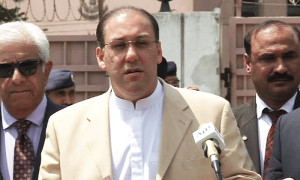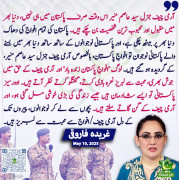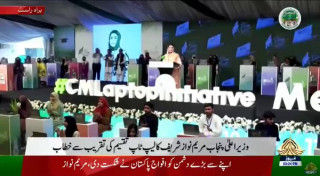While technology may have strengthened the fight against HIV and AIDS in many countries, in Pakistan it has led to an increase in HIV infection among young people, health experts and activists have warned.
Mobile apps and social media have opened new avenues for social encounters in the conservative south Asian country, The GuardianreportedFor gay men and male sex workers in particular, smartphones provide a degree of sexual liberation, a way of connecting with partners away from the streets. Yet many remain unaware of the risks of HIV, allowing the spread of the virus to accelerate.

HIV rates have jumped dramatically in Pakistan over the past 10 years, from 8,360 people living with HIV in 2005 to nearly 46,000 in 2015 – a 17.6% annual increase, compared with 2.2% worldwide – according to one recent tally. Social stigma surrounding homosexuality means actual numbers are likely to be much higher.“In Pakistan, there has been a rise in HIV among boys and men, due to easy access to male dating apps, because of advancement in technology, and availability of inexpensive gadgets,” said Sophia Furqan, a senior programme officer with the National Aids Control Programme in Pakistan.Furqan recently helped to compile a survey of HIV infections in Pakistan, in which about 39% of respondents said they found their sexual partners using mobile apps.
In other developing countries, apps have made it easier to detect the virus and access treatment. But in Pakistan, public debate about HIV is choked by stigma, homosexuality is taboo and, as a result, information on sexually transmitted diseases is severely limited.Yasir, 41, who wears his hair long and full, his eyes painted with mascara, started as a sex worker seven years ago to support his 10 family members. It took him four years in the business to find out what HIV was – through an Indian television show.“As soon as I became aware that there was such a disease, I rushed to the clinic to get tested,” he said.By then, it was too late. Yasir has now lived with HIV for three years. He has learned enough about contraception to discuss it with friends, but he doesn’t tell anyone he is infected. Other sex workers might spread the word to clients in order to hurt the competition, he explained. “If I had known about HIV earlier, I would have used condoms,” he said.
Technology has also triggered an inadvertent rise in infection rates elsewhere. Health experts in the UK and US have warned dating apps could lead to an increase in sexually transmitted diseases, with apps like Tinder and Grindr making it easier to arrange casual hookups with unknown partners.Add to that the perceived shame of both homosexuality and HIV in Pakistan, and the fact that sex education in Pakistani schools is severely lacking, and the risk of spreading STDs is even greater. Only 8.6% of men engaging in same-sex relations who were polled in the recent survey used condoms, said Furqan.In Lahore, Pakistan’s second largest city, the few offers of HIV counselling are provided by private NGOs such as the Dostana Male Health Society, which works with the LGBT community and male sex workers.Dostana gives out free contraceptives and lubricants, and will soon begin distributing pre-exposure prophylaxis under a Global Fund grant in collaboration with the National Aids Control Programme.
Raza Haidar, a programme manager at Dostana, said there was “no doubt” that mobile apps and social media had promoted the spread of sexually transmitted diseases. While he acknowledged that same-sex relations have always been possible, Haidar said apps and social media have made approaching strangers easier, particularly for men.Gay relationships outside marriage are easier to conceal than heterosexual ones, which are considered equally dishonourable. A man and a woman in the same room will immediately raise suspicions, “but families will think that two men are just friends,” said Haidar.Seven years ago, at the age of 19, Ayan started out as a sex worker to support his family. Ayan was a child when his father died, and the oldest son. Sex work came to replace his plans of going to college. Two years ago, soon after learning about the disease, he was diagnosed with HIV.
Still, he has continued his work. For Ayan, apps and social media have not only made life safer by allowing him to approach customers off the street – out of the sight of violent police who often demand bribes – but are also good for business, even mainstream platforms like Facebook. “Every app is a dating app,” Ayan said.
Source
[FONT="]
[/FONT]
[FONT="]برطانوی اخبار گارجین کی رپورٹ کے مطابق دنیا کے کئی ممالک میں ٹیکنالوجی کی مدد سے ایڈز کو شکست دی جارہی ہے جبکہ پاکستان میں یہ ٹیکنالوجی نوجوانوں میں ایڈز کے پھیلاؤ کا سبب بن رہی ہے۔ طبی ماہرین اور سماجی کارکنوں نے خبردار کیا ہے کہ موبائل فون ایپلی کیشنز اور سوشل میڈیا نے نوجوانوں کے درمیان باہم ملنے جلنے کے نئے دروازے کھول دیے ہیں اور ٹیکنالوجی ہم جنس پرستی کو فروغ دینے کا بھی ذریعہ بن رہی ہے جس کے نتیجے میں ایڈز کا مرض بھی پھیل رہا ہے۔[/FONT]
[FONT="]
[/FONT]
[FONT="]ملک میں ہم جنس پرست افراد رابطے کے لیے موبائل فون ایپلی کیشنز سے فائدہ اٹھا رہے ہیں۔ 10 سال میں پاکستان میں ایڈز کی مریضوں کی تعداد میں ڈرامائی حد تک سالانہ 17.6 فیصد اضافہ ہوا ہے۔ 2005 میں ان کی تعداد 8360 تھی جو 2015 میں 46 ہزار تک پہنچ گئی ہے۔ یہ بھی کہا جارہا ہے کہ ایڈز کے حقیقی مریضوں کی تعداد اس سے بھی کہیں زیادہ ہوسکتی ہے۔[/FONT]
[FONT="]
[/FONT]
[FONT="]نیشنل ایڈز کنٹرول پروگرام کی اعلیٰ افسر صوفیہ فرقان نے بتایا کہ مردوں کے رابطے کی موبائل ایپس کی وجہ سے لڑکوں اور بڑی عمر کے افراد میں ایڈز پھیل رہا ہے۔ انہوں نے جدید ٹیکنالوجی اور سستی موبائل ڈیوائسز کو اس کی وجہ قرار دیا۔ برطانوی اخبار کے مطابق ٹیکنالوجی دنیا کے دیگر ممالک میں بھی ایڈز کے پھیلاؤ کی وجہ بن رہی ہے جن میں امریکا اور برطانیہ بھی شامل ہیں۔ صوفیہ نے ایک حالیہ سروے کا حوالہ دیتے ہوئے کہا کہ اس سروے میں 39 فیصد افراد نے اعتراف کیا کہ انہوں نے اپنے ساتھی یا دوست کو موبائل ایپس کے ذریعے تلاش کیا تھا۔[/FONT]
[FONT="]
[/FONT]
[FONT="]اسی طرح پاکستان میں لڑکے لڑکیوں کی باہمی شناسائی اور ملاقات کی متعدد ویب سائٹس بھی کام کررہی ہیں۔ پاکستان میں خواجہ سراؤں کی معاونت کے لیے کام کرنے والی این جی او دوستانہ میل ہیلتھ سوسائٹی کے افسر رضا حیدر نے بتایا کہ بلاشبہ موبائل ایپس اور سوشل میڈیا جنسی بیماریوں کے فروغ کی بڑی وجہ ہیں۔ ان ایپس کی وجہ سے اجنبیوں کا ایک دوسرے سے رابطہ کرنا آسان ہوگیا ہے۔ ایڈز سے متاثرہ ایک شخص ایان نے بتایا کہ پاکستان میں ہر دوسری موبائل ایپ ڈیٹنگ ایپ ہے
https://www.express.pk/story/1013813/[/FONT][/FONT]
Mobile apps and social media have opened new avenues for social encounters in the conservative south Asian country, The GuardianreportedFor gay men and male sex workers in particular, smartphones provide a degree of sexual liberation, a way of connecting with partners away from the streets. Yet many remain unaware of the risks of HIV, allowing the spread of the virus to accelerate.

HIV rates have jumped dramatically in Pakistan over the past 10 years, from 8,360 people living with HIV in 2005 to nearly 46,000 in 2015 – a 17.6% annual increase, compared with 2.2% worldwide – according to one recent tally. Social stigma surrounding homosexuality means actual numbers are likely to be much higher.“In Pakistan, there has been a rise in HIV among boys and men, due to easy access to male dating apps, because of advancement in technology, and availability of inexpensive gadgets,” said Sophia Furqan, a senior programme officer with the National Aids Control Programme in Pakistan.Furqan recently helped to compile a survey of HIV infections in Pakistan, in which about 39% of respondents said they found their sexual partners using mobile apps.
In other developing countries, apps have made it easier to detect the virus and access treatment. But in Pakistan, public debate about HIV is choked by stigma, homosexuality is taboo and, as a result, information on sexually transmitted diseases is severely limited.Yasir, 41, who wears his hair long and full, his eyes painted with mascara, started as a sex worker seven years ago to support his 10 family members. It took him four years in the business to find out what HIV was – through an Indian television show.“As soon as I became aware that there was such a disease, I rushed to the clinic to get tested,” he said.By then, it was too late. Yasir has now lived with HIV for three years. He has learned enough about contraception to discuss it with friends, but he doesn’t tell anyone he is infected. Other sex workers might spread the word to clients in order to hurt the competition, he explained. “If I had known about HIV earlier, I would have used condoms,” he said.
Technology has also triggered an inadvertent rise in infection rates elsewhere. Health experts in the UK and US have warned dating apps could lead to an increase in sexually transmitted diseases, with apps like Tinder and Grindr making it easier to arrange casual hookups with unknown partners.Add to that the perceived shame of both homosexuality and HIV in Pakistan, and the fact that sex education in Pakistani schools is severely lacking, and the risk of spreading STDs is even greater. Only 8.6% of men engaging in same-sex relations who were polled in the recent survey used condoms, said Furqan.In Lahore, Pakistan’s second largest city, the few offers of HIV counselling are provided by private NGOs such as the Dostana Male Health Society, which works with the LGBT community and male sex workers.Dostana gives out free contraceptives and lubricants, and will soon begin distributing pre-exposure prophylaxis under a Global Fund grant in collaboration with the National Aids Control Programme.
Raza Haidar, a programme manager at Dostana, said there was “no doubt” that mobile apps and social media had promoted the spread of sexually transmitted diseases. While he acknowledged that same-sex relations have always been possible, Haidar said apps and social media have made approaching strangers easier, particularly for men.Gay relationships outside marriage are easier to conceal than heterosexual ones, which are considered equally dishonourable. A man and a woman in the same room will immediately raise suspicions, “but families will think that two men are just friends,” said Haidar.Seven years ago, at the age of 19, Ayan started out as a sex worker to support his family. Ayan was a child when his father died, and the oldest son. Sex work came to replace his plans of going to college. Two years ago, soon after learning about the disease, he was diagnosed with HIV.
Still, he has continued his work. For Ayan, apps and social media have not only made life safer by allowing him to approach customers off the street – out of the sight of violent police who often demand bribes – but are also good for business, even mainstream platforms like Facebook. “Every app is a dating app,” Ayan said.
Source
[FONT="]لندن: پاکستان میں جدید ٹیکنالوجی ایڈز جیسی مہلک بیماری اور ہم جنس پرستی کو فروغ دینے کا باعث بن رہی ہے۔
[FONT="]
[/FONT]
[FONT="]برطانوی اخبار گارجین کی رپورٹ کے مطابق دنیا کے کئی ممالک میں ٹیکنالوجی کی مدد سے ایڈز کو شکست دی جارہی ہے جبکہ پاکستان میں یہ ٹیکنالوجی نوجوانوں میں ایڈز کے پھیلاؤ کا سبب بن رہی ہے۔ طبی ماہرین اور سماجی کارکنوں نے خبردار کیا ہے کہ موبائل فون ایپلی کیشنز اور سوشل میڈیا نے نوجوانوں کے درمیان باہم ملنے جلنے کے نئے دروازے کھول دیے ہیں اور ٹیکنالوجی ہم جنس پرستی کو فروغ دینے کا بھی ذریعہ بن رہی ہے جس کے نتیجے میں ایڈز کا مرض بھی پھیل رہا ہے۔[/FONT]
[FONT="]
[/FONT]
[FONT="]ملک میں ہم جنس پرست افراد رابطے کے لیے موبائل فون ایپلی کیشنز سے فائدہ اٹھا رہے ہیں۔ 10 سال میں پاکستان میں ایڈز کی مریضوں کی تعداد میں ڈرامائی حد تک سالانہ 17.6 فیصد اضافہ ہوا ہے۔ 2005 میں ان کی تعداد 8360 تھی جو 2015 میں 46 ہزار تک پہنچ گئی ہے۔ یہ بھی کہا جارہا ہے کہ ایڈز کے حقیقی مریضوں کی تعداد اس سے بھی کہیں زیادہ ہوسکتی ہے۔[/FONT]
[FONT="]
[/FONT]
[FONT="]نیشنل ایڈز کنٹرول پروگرام کی اعلیٰ افسر صوفیہ فرقان نے بتایا کہ مردوں کے رابطے کی موبائل ایپس کی وجہ سے لڑکوں اور بڑی عمر کے افراد میں ایڈز پھیل رہا ہے۔ انہوں نے جدید ٹیکنالوجی اور سستی موبائل ڈیوائسز کو اس کی وجہ قرار دیا۔ برطانوی اخبار کے مطابق ٹیکنالوجی دنیا کے دیگر ممالک میں بھی ایڈز کے پھیلاؤ کی وجہ بن رہی ہے جن میں امریکا اور برطانیہ بھی شامل ہیں۔ صوفیہ نے ایک حالیہ سروے کا حوالہ دیتے ہوئے کہا کہ اس سروے میں 39 فیصد افراد نے اعتراف کیا کہ انہوں نے اپنے ساتھی یا دوست کو موبائل ایپس کے ذریعے تلاش کیا تھا۔[/FONT]
[FONT="]
[/FONT]
[FONT="]اسی طرح پاکستان میں لڑکے لڑکیوں کی باہمی شناسائی اور ملاقات کی متعدد ویب سائٹس بھی کام کررہی ہیں۔ پاکستان میں خواجہ سراؤں کی معاونت کے لیے کام کرنے والی این جی او دوستانہ میل ہیلتھ سوسائٹی کے افسر رضا حیدر نے بتایا کہ بلاشبہ موبائل ایپس اور سوشل میڈیا جنسی بیماریوں کے فروغ کی بڑی وجہ ہیں۔ ان ایپس کی وجہ سے اجنبیوں کا ایک دوسرے سے رابطہ کرنا آسان ہوگیا ہے۔ ایڈز سے متاثرہ ایک شخص ایان نے بتایا کہ پاکستان میں ہر دوسری موبائل ایپ ڈیٹنگ ایپ ہے
https://www.express.pk/story/1013813/[/FONT]
- Featured Thumbs
- https://i.imgur.com/VAkQSoI.jpg
Last edited by a moderator:


































